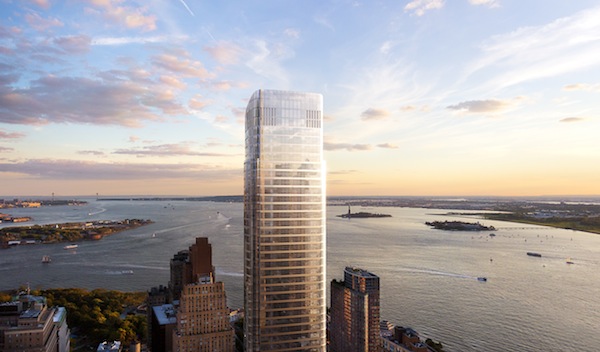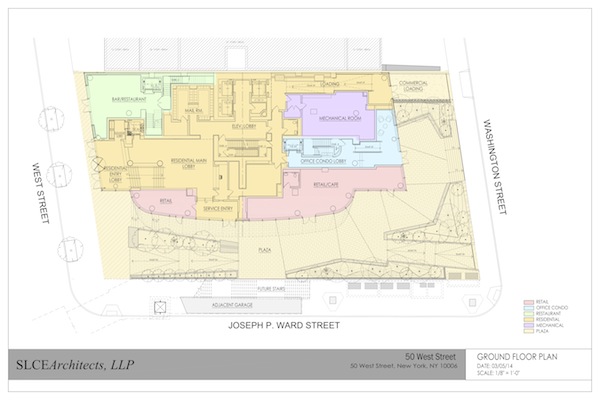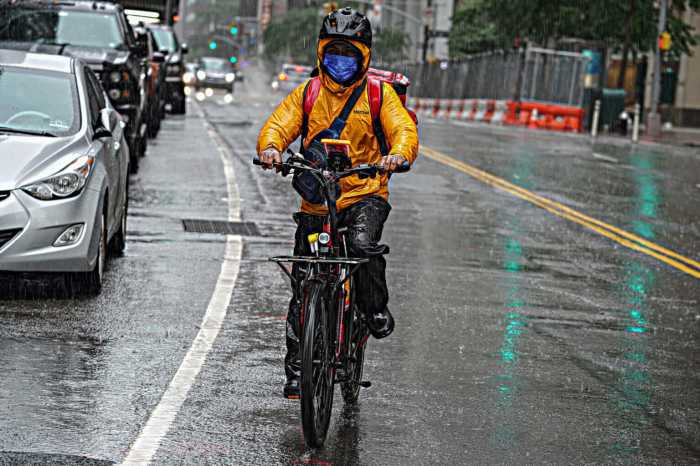
BY SAM SPOKONY | ORIGINALLY PUBLISHED MARCH 6, 2014 | Now that the previously stalled 50 West St. luxury condo project is back from the dead, Downtown residents can also look forward to the development’s planned public space, which will further help link the Financial District to Battery Park City.
However, that lag time on the condos has also put a three-year hold on the nearly $5 million the developer had agreed to pay towards Downtown affordable housing in an almost-forgotten deal struck with the city in 2007. After it was originally planned to be paid out in 2013, the developer will now have until mid-2016 — which is when 50 West St. is now expected to be complete — to shell out that cash.
Time Equities, which is developing the site, finally broke ground last October after the project — originally planned as a 65-story hotel/residential tower — was sidetracked for years following the nation’s financial crisis in 2008. Now 50 West St. is being built as a 63-story tower, minus the hotel, which in addition to the condos will also include ground-floor retail, a bar/restaurant and one floor of office space, according to the developer.
Speaking at the March 5 meeting of Community Board 1’s Financial District Committee, Time Equities C.E.O. Francis Greenburger said he has also since cut down the number of condos planned for the tower — from around 300 to around 200 — in order to increase the size of the units, which will range from one to four bedrooms.
He also noted that his plans for a privately owned public space — sometimes referred to as POPS — outside 50 West St. have remained the same as when the project was originally conceived.
That outdoor space — aside from providing the benefit of public seating — will lie adjacent to the eastern mouth of the much-anticipated W. Thames St. Pedestrian Bridge, a federally-funded, city-planned project that will span West St. in order to connect FiDi and B.P.C. The city has said it expects to complete the pedestrian bridge by the end of 2016.
“So one of the things we’ve done is to create space in our plan to allow people to access our public plaza directly from that bridge,” said Robert Singer, a project manager for 50 West St. “And that will basically extend the direct connection from Battery Park City.”
And just as there are many different elements mixed within its overall framework, the history behind the approval of the 50 West St. project is certainly filled with its own complexities.
Since its location next to the Battery Tunnel Garage needed a zoning variance for the build-out, Greenburger in 2007 had to go through the city’s Uniform Land Use Review Procedure known as ULURP — which requires input from the community board and borough president, and the approval of both the City Planning Commission and the City Council — in order to make the project possible.
Early in that process, local officials strongly urged the developer to invest in affordable housing for other parts of the community — since it was clear from the start that 50 West St. wasn’t going to have affordable units — but Greenburger initially declined to do that.
The resulting resistance on the part of the local leaders, including former District 1 Councilmember Alan Gerson, seemed at the time as if it would lead to a bitter showdown before potential approval of the project.
Eventually, however, Gerson was able to broker a deal between Greenburger and the city that, by all accounts, made everyone relatively happy. Along with his previous commitment, pushed by C.B. 1, to give hundreds of thousands of dollars in funding to area schools — providing new laptops and other materials for P.S./I.S. 89 and helping to save the Lower East Side’s Center for Space Science Education — the developer also made a commitment to Downtown affordable housing.
So by the time the City Council ended the ULURP in November 2007 by approving the 50 West St. project, Greenburger agreed, among other things, to pay $4.6 million to the New York City Economic Development Corporation, for allocation directly toward the creation or preservation of affordable housing below Houston St.
The school-related money, totaling $785,000, was paid out in 2008, and the original agreement would have had the developer pay the housing money by 2013. But then, largely due the financial crisis of 2008, construction on the condos was stopped before it had even really started.
Eventually, a number of other false starts on the project led Greenburger to renegotiate his deal with the city in order to gain more time.
In 2012, the developer and the city agreed to amend the deal, by pushing back the original deadline of the $4.6 million payment by three years, according to an E.D.C. spokesperson. So instead of the money arriving in 2013, it won’t be due until June 2016.
In exchange for getting break on the timing, Greenburger in 2012 also paid E.D.C. $1.3 million in interest — although that particular money was not earmarked for affordable housing.
In any case, Gerson — who was subsequently defeated by Margaret Chin in the 2009 election — still touts the original deal he brokered in 2007 as an “early model” of what Mayor Bill de Blasio now talks about when it comes to compelling luxury developers to do their part in boosting low-income housing.
“Any development beyond what’s as of right should be linked to affordable housing, whether that means including housing within the development or contributing to affordable housing elsewhere,” Gerson told Downtown Express this week. “That’s the model I wanted to apply in our Council district, and that’s what we did [with 50 West St.].”


































